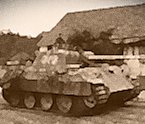Telemecus
Posts: 4689
Joined: 3/20/2016
Status: offline

|
Phase II Barbarossa: Tottenritt - the capture of Moscow Turn 11 28-August-1941 To Turn 21 12-November-1941 Retrospective on Strategy
The Plan
On the initiative of Stelteck we created a new plan for the second phase of Barbarossa Campaign for the capture of Moscow. We gave it the name Tottenritt.
quote:
ORIGINAL: Stelteck
Moscow offensive.
Hi. As the battle for Moscow will soon begin, let me share some view about it.
First, i will probably not be able to take moscow with only 2 panzer groups...
Panzer group north and south have to participate in the battle of moscow, with some infantry support, if we want to succeed.
On the other hand, giving me, as AGC commander, control other panzer group north and south would be quite boring for the north and south commander.
So a good idea would be to devise a plan in order that AGN and AGS participate in the battle for moscow, by sending panzer toward moscow on alternative route on their own, for example. Like a race 
Would be great fun.
quote:
ORIGINAL: Stelteck
I think it would be better if AGN and AGC commander keep control of their panzer group and forces and use them to rush to moscow on their own, with as many forces as they could.
It would be realistic and fun.
Maybe each commander could propose a plan how best to use their forces for this operation and propose an axe of progression ?
The last commander to reach moscow will be summoned by the furher for "explanation".... 
At first there was some confusion over what exactly would be the axis of progression. Would our North commander for instance be commanding 4th panzer group but operating in front of AGC infantry armies? I believe that being a team game should not constrain us from doing anything we could do as a single player. So would axis of advance and areas of command overlap? But our final plan made it clear each would have their own area of operations. North would cross the Volkhov and sweep south while South would sweep north as far east as Voronezh.

Each commander continued to have a broad remit to pursue their objectives as they saw best and to organise their own internal allocations and chains of command. However the boundaries North and South had with centre was to move towards the centre allowing their infantry to concentreate on the battle for Moscow. And our centre commander got all his motorised corps back!
The air campaign was intensified and strategic bombing was given a higher priority, sometimes ahead of providing ground support. Meanwhile in the rear Supreme took charge of all rear area garrisoning.
The Results
Having agreed a plan did not mean every commander followed it to the letter
quote:
ORIGINAL: Stelteck
Rostov is lovely ... but it is not on the way to Moscow....
In the north the sweep was shallower as our opponents managed to escape a pocket in the making. So instead 4th Panzer group moved south on internal lines and took Kalinin and Torzhok. But the infantry from the north took over the front as far south as the same row as North Moscow. Eventually we could see Moscow was going to be captured by centre alone. The best help others could give was to encircle enemy formations anywhere which helps everywhere. Finally we looked to capture Voronezh as another priority - but were foiled by freak mud weather on turn 16.
Our rail plan had been for FBD4 to complete a small loop in the north up to Pskow and Dno before being railed south to start repairing a rail line from DTown towards the centre. With Leningrad gone we cut short the loop at Pskow and repaired southwards leaving out Dno. But with FBD4 already on rails in Poland heading south the changing situation meant it had to double back and repair another line towards Torzhok. A couple of turns of rail repair were lost as a result - but when the facts change the plan has to change. The knock on effect of our opening strategy in the south, which delayed the start of rail repair out of Rumania, and the prioritisation of rail repair for the North, with the success we had in the South reaching Rostov, meant...

We had broken into Crimea and actually had clear weather there. But with our supply coming from rails in the mud zone all our units were isolated while our opponents were in full supply. Meaning we had to quickly backtrack from our advances in the Crimea. This continues into a phoney war in the Crimea as we remained at the entrances to the Peninsula while our opponents stayed at their forts at Sevastopol and on the way to Kerch.
All three RHG HQs as well as a Rumanian and a Finnish HQ acted as pseudo rail repair FBDs by holding construction units as SUs and deployed near to desired extra areas of rail repair.
The Big Story though is WE GOT MOSCOW.
In the air war we had achieved total dominance with the enemy air force no longer contesting control of air space. This enabled us to provide unopposed ground support to our troops, as well as continue our strategic bombing campaign. Soviet fighter bomber factories were actually evacuated as a result. Our targeting has prioritised fighter bomber and tank factories followed by vehicle factories with heavy industry coming last. Resource factories have not been targeted and arms factories only occasionally bombed when no other priority target was available.
The following shows the relative states our OOB, manpower and formations.




 Attachment (1) Attachment (1)
< Message edited by Telemecus -- 5/2/2018 9:49:25 PM >
|
 Printable Version
Printable Version















 . In my mind I am planning to hold a line from Moscow to Tula and then bend back from there. Thus the building up of fortress zones. At this point I do not think the Soviets have enough stuff to breach a big hole that has a determined defense.
. In my mind I am planning to hold a line from Moscow to Tula and then bend back from there. Thus the building up of fortress zones. At this point I do not think the Soviets have enough stuff to breach a big hole that has a determined defense. 


















 New Messages
New Messages No New Messages
No New Messages Hot Topic w/ New Messages
Hot Topic w/ New Messages Hot Topic w/o New Messages
Hot Topic w/o New Messages Locked w/ New Messages
Locked w/ New Messages Locked w/o New Messages
Locked w/o New Messages Post New Thread
Post New Thread